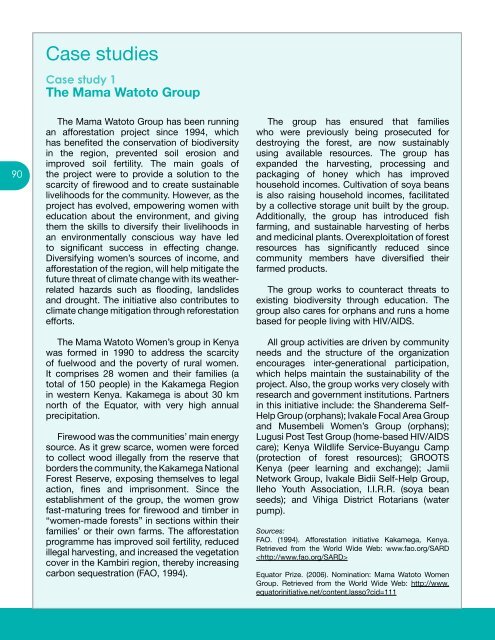GGCA Gender and Climate Change Training Manual - Women's ...
GGCA Gender and Climate Change Training Manual - Women's ...
GGCA Gender and Climate Change Training Manual - Women's ...
You also want an ePaper? Increase the reach of your titles
YUMPU automatically turns print PDFs into web optimized ePapers that Google loves.
Case studies<br />
Case study 1<br />
The Mama Watoto Group<br />
90<br />
The Mama Watoto Group has been running<br />
an afforestation project since 1994, which<br />
has benefited the conservation of biodiversity<br />
in the region, prevented soil erosion <strong>and</strong><br />
improved soil fertility. The main goals of<br />
the project were to provide a solution to the<br />
scarcity of firewood <strong>and</strong> to create sustainable<br />
livelihoods for the community. However, as the<br />
project has evolved, empowering women with<br />
education about the environment, <strong>and</strong> giving<br />
them the skills to diversify their livelihoods in<br />
an environmentally conscious way have led<br />
to significant success in effecting change.<br />
Diversifying women’s sources of income, <strong>and</strong><br />
afforestation of the region, will help mitigate the<br />
future threat of climate change with its weatherrelated<br />
hazards such as flooding, l<strong>and</strong>slides<br />
<strong>and</strong> drought. The initiative also contributes to<br />
climate change mitigation through reforestation<br />
efforts.<br />
The Mama Watoto Women’s group in Kenya<br />
was formed in 1990 to address the scarcity<br />
of fuelwood <strong>and</strong> the poverty of rural women.<br />
It comprises 28 women <strong>and</strong> their families (a<br />
total of 150 people) in the Kakamega Region<br />
in western Kenya. Kakamega is about 30 km<br />
north of the Equator, with very high annual<br />
precipitation.<br />
Firewood was the communities’ main energy<br />
source. As it grew scarce, women were forced<br />
to collect wood illegally from the reserve that<br />
borders the community, the Kakamega National<br />
Forest Reserve, exposing themselves to legal<br />
action, fines <strong>and</strong> imprisonment. Since the<br />
establishment of the group, the women grow<br />
fast-maturing trees for firewood <strong>and</strong> timber in<br />
“women-made forests” in sections within their<br />
families’ or their own farms. The afforestation<br />
programme has improved soil fertility, reduced<br />
illegal harvesting, <strong>and</strong> increased the vegetation<br />
cover in the Kambiri region, thereby increasing<br />
carbon sequestration (FAO, 1994).<br />
The group has ensured that families<br />
who were previously being prosecuted for<br />
destroying the forest, are now sustainably<br />
using available resources. The group has<br />
exp<strong>and</strong>ed the harvesting, processing <strong>and</strong><br />
packaging of honey which has improved<br />
household incomes. Cultivation of soya beans<br />
is also raising household incomes, facilitated<br />
by a collective storage unit built by the group.<br />
Additionally, the group has introduced fish<br />
farming, <strong>and</strong> sustainable harvesting of herbs<br />
<strong>and</strong> medicinal plants. Overexploitation of forest<br />
resources has significantly reduced since<br />
community members have diversified their<br />
farmed products.<br />
The group works to counteract threats to<br />
existing biodiversity through education. The<br />
group also cares for orphans <strong>and</strong> runs a home<br />
based for people living with HIV/AIDS.<br />
All group activities are driven by community<br />
needs <strong>and</strong> the structure of the organization<br />
encourages inter-generational participation,<br />
which helps maintain the sustainability of the<br />
project. Also, the group works very closely with<br />
research <strong>and</strong> government institutions. Partners<br />
in this initiative include: the Sh<strong>and</strong>erema Self-<br />
Help Group (orphans); Ivakale Focal Area Group<br />
<strong>and</strong> Musembeli Women’s Group (orphans);<br />
Lugusi Post Test Group (home-based HIV/AIDS<br />
care); Kenya Wildlife Service-Buyangu Camp<br />
(protection of forest resources); GROOTS<br />
Kenya (peer learning <strong>and</strong> exchange); Jamii<br />
Network Group, Ivakale Bidii Self-Help Group,<br />
Ileho Youth Association, I.I.R.R. (soya bean<br />
seeds); <strong>and</strong> Vihiga District Rotarians (water<br />
pump).<br />
Sources:<br />
FAO. (1994). Afforestation initiative Kakamega, Kenya.<br />
Retrieved from the World Wide Web: www.fao.org/SARD<br />
<br />
Equator Prize. (2006). Nomination: Mama Watoto Women<br />
Group. Retrieved from the World Wide Web: http://www.<br />
equatorinitiative.net/content.lasso?cid=111

















